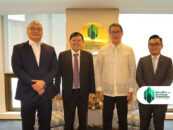
3 Ways the Philippines is Navigating the Future of Its Digital Economy
by Johanan Devanesan August 24, 2023Held at the Shangri-La The Fort in Taguig City, Philippines from 7th to 8th August 2023, the INDX 3 Summit brought together some of the most progressive minds in the country’s fintech sector to discuss developments of its burgeoning digital economy.
Under the banner “Creating What’s Next In Digital: Dare-Drive-Defy”, the prestigious annual event hosted by Fintech Alliance PH provided a platform for influential figures from the digital finance realm of the Philippines – encompassing policymakers, regulators, and the prime movers of the industry – to share their knowledge and insights impacting the local economy. The summit’s discussions revolved around the ever-evolving landscape of the fintech industry, probing the profound implications it has for the future.
One of the core objectives of the INDX 3 Summit was to champion the blossoming digital economy of the Philippines. By acting as a conduit between consumers and the latest technological breakthroughs, the event shone a light on how pivotal new innovations are in shaping and accelerating growth in today’s digital economy — highlighting financial inclusion efforts and innovative concepts that can enrich the progression of the Philippines.

Here are three digital-led initiatives being championed by the Philippines government at the Summit, which will have significant ramifications for the economy in the coming years.
eGov
With President Ferdinand Marcos Jr.’s mandate of having e-government services with unified, citizen-centric platforms, two months ago the government launched the eGov PH Super App, as detailed in the Philippines Fintech Report 2023.
The mobile application is a one-stop-shop platform for various national and local government transactions, streamlining processes and transactions in a bid to provide ease of doing business with at least 26 national government agencies.
At the INDX 3 Summit, David Almirol Jr, the Undersecretary of the Department of Information and Communications Technology (DICT), shed further light on the Philippines’ transformative journey with eGov – the country’s e-governance strategy.
David highlighted a critical challenge the DICT faces is ensuring precision in planning and coordination with other government agencies, thereby streamlining processes and avoiding inefficiencies. A significant step in this direction is the e-governance bill which, once enacted, will unify all the fragmented government systems, enabling seamless communication between them. This internal synergy will drastically reduce redundancies, making tasks more efficient for both the government and the citizens.

He highlighted a prevalent issue many citizens face – the repetitive submission of documents and details across different government agencies. With the new e-governance bill, these often-tedious processes will be simplified. Furthermore, the eGov Super App and the eGov Cloud are other milestones. The Super App offers a plethora of services, from bill payments and loan inquiries to applying for passports and driver’s licenses — all hosted now from the eGov Cloud.
Not only does this centralise services, but in the long run will also create job opportunities and aid sectors like tourism. With the unwavering support of the president and the efforts of DICT, the e-governance strategy in the Philippines promises a future where bureaucratic processes are streamlined, inefficiencies reduced, and the lives of its citizens improved.
As David fittingly concludes, the challenge is not only in the development of these digital platforms but in ensuring that they are implemented efficiently and beneficially for all.
Open Finance
The BSP, backed by the International Finance Corporation (IFC) and the World Bank, has launched the Open Finance PH Pilot, moving a step closer to its ambition to leverage open banking and data sharing to advance financial inclusion and foster collaboration in the financial services industry.
That was the focus of the panel discussion on Open Finance in the Philippines, comprising luminaries like BSP Deputy Governor Chuchi Fonacier, IFC World Bank’s Philippines country manager Jean-Marc Arbogast, and moderated by Fintech Alliance PH trustee Imelda Tiongson. These leaders shed light on the future of open finance, emphasising its potential in transforming the financial sector.

To realise this potential, Chuchi emphasised the importance of setting clear expectations for market players. From banks to fintech firms, everyone must understand and abide by the rules set out in this new financial playground. She stressed that clarity in guidelines will establish a strong foundation, ensuring security and privacy while enhancing inclusivity.
Jean-Marc highlighted the significant movements in open banking and finance worldwide. Countries are quickly adopting frameworks, presenting an opportunity for nations like the Philippines to leapfrog into innovative practices. Working alongside BSP and other global organisations, the IFC World Bank is keen to disseminate the knowledge garnered across different nations, according to Jean-Marc.
He also highlighted the crucial business aspect of open finance. It presents an invaluable proposition not just for consumers but also financial institutions. By adopting open finance, institutions can onboard new clients, optimise their existing clientele, reduce costs, and expand their service offerings.
When asked about the transformations anticipated in the next five years, the answers were insightful. While Chuchi highlighted “partnerships, collaboration, and security,” Jean-Marc chose to focus on “inclusive sustainable innovations.” These projections hint at a future where not just the financial sector, but also industries at large benefit from open finance.

The panel discussion emphasised the importance and potential of open finance in the Philippines. With clear guidelines, international collaboration, and an eye on sustainability and security, the future of finance could be brighter than ever for all Filipinos.
Project Agila CBDC Pilot
The central bank is also exploring applications of Central Bank Digital Currencies, or CBDCs, that could have major impacts on the Philippines economy. BSP Deputy Governor Mamerto E. Tangonan told the INDX 3 Summit that the primary motivation behind exploring CBDCs is the potential cost savings in payments and increased efficiency.
The ability of CBDCs to combine the characteristics of cash with digital formality simplifies transactions and mirrors the ease people find in cash transactions. The Deputy Governor added that another pivotal aspect is the enhancement of payment system safety and resilience.
By using distributed ledger technology, CBDCs eliminate a single point of failure, DG Mamerto said — providing not only a backup system but potentially an alternative to the real-time gross settlement system.

Financial inclusion also stands at the core of CBDC development. By presenting a risk-free instrument backed by the central bank, CBDCs can counter the rise of privately issued currencies like stablecoins. Additionally, being digital, CBDCs simplify the process of issuance, distribution, and monitoring, enhancing monetary policy transmission.
The DG elaborated that Project Agila represents the BSP’s pilot project for CBDCs. Named after the Philippine Eagle, the project symbolises a balanced approach to growth and development, blending the vigour of public and private sectors.
The project has two primary phases: the proof of concept and the prototype phase. These steps will help to evaluate the best technology for CBDCs in the Philippines, focusing on controlled access, security, efficiency, availability, interoperability, flexibility, and programmability.
With collaboration between the BSP, financial institutions, government sectors, and the business community, the Philippines aims to build a thriving digital economy by defying traditional norms and harnessing these advancements.
The introduction and potential success of CBDCs in the Philippines signal a promising, inclusive digital financial future. The commitment of regulators to this and a host of other progressive ventures showcases a nation poised for financial innovation and progress.








